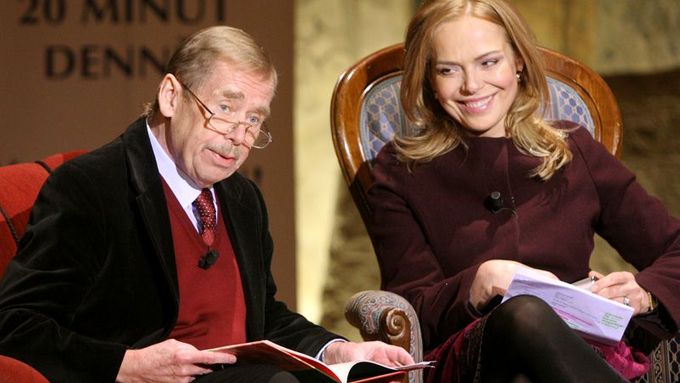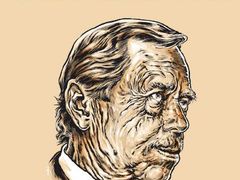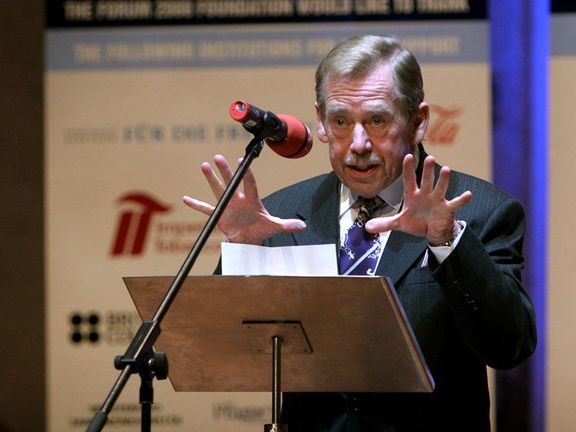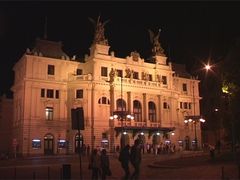Prague - The first play Václav Havel has written in nearly two decades is still waiting for its premiere in May next year but it has already been announced there wil be a film version of it made soon afterwards.
The information has been confirmed by the expresident himself in an interview for Lidové Noviny daily.
Earlier this year, intense rumours and speculations surrounded the negotiations over who gets to premiere the play. In the end, Vinohrady Theatre surprisignly won, when the National Theatre, tipped to get the honour, declined to accomodate the author's wishes for his wife Dagmar to play a major role in the piece.
READ MORE: No more disputes. Havel goes to Vinohrady
Poet with the camera to direct
The idea to make a film based on Havel's much-awaited latest offering was conceived by Jaroslav Brabec, acclaimed cinematographer and photographer who proved himself by turning at least three 19th and early 20th century Czech literary masterpieces into successful films.
"It was my idea and Havel accepted it," said Brabec, whose intention is to make a full-blown movie, not a mere record of the stage drama.
He is now working on the script with the playwright himself and plans to start shooting in the summer next year. "The film depends on cherries during their ripening stage," Brabec alluded to the theme of Cherry Orchard which is present in the play.
Havel's camp on the set
While the cast of the movie is a big unkwnon at the moment, there is one certainty: Mrs. Havlová's presence. And there are other people close to Havel who will get to work on the film as well.
Costume designs are to be provided by Theodor Pištěk who not only won an Oscar for his work on Havel's close friend Miloš Forman's Amadeus, but also designed uniforms for the Prague Castle Guard after the former dissident became president in the wake of 1989's Velvet Revolution.
Bořek Šípek who is to take care of the film's production design used to be Havel's chief architect at the Castle and the film's score composer Michael Kocáb was Havel's right hand man during the heady days of the former communist regime's dismantling.
Producer of the film Olga Kelymanová is a wife of film director Jiří Menzel, who won the prestigious Academy Award in 1968 for his Closely Watched Trains, a film adaptation of the eponymous novel by the late Bohumil Hrabal.
"I'm happy about the offer, but I don't have any more specific idea at the moment. I've only read the play as the screenplay is not ready yet," Pištěk told Lidové Noviny.
Havel on screen
Václav Havel is to appear on screen as well. There are passages in the play where the author is calling on the actors and spectators from a loudspeaker, others where he talks to himself, agonizes in doubts and thinks out loud.
The text of the play, reportedly inspired by the year 1968, was finished last June. Havel began writing it in the 1980s, but then got busy making history and only returned to it after leaving the presidential office in 2003.
"Speculations about who is depicted in the play, whether I or Václav Klaus (Havel's successor and long-time political rival - note by A.cz), will die down with the pasing time and it will no longer matter who represents whom," said Havel while presenting his play, published last month.
The play revolves around a central character of an outgoing ruler who has to vacate a state villa. There are archetypes of a bootlicker and a traitor in his entourage.
Inspired by Shakespeare, Chekhov
Havel is said to have found inspiration in Shakespeare's King Lear and Chekhov's Cherry Orchard when writing his latest opus. The play is now being translated into several world languages.
Critics believe that Leaving is one of the best pieces Havel has written. The National Theatre got a flak for not being polite and smart enough to accomodate the world renown playwright's wishes.
Vinohrady Theatre, which usually attracts a petit bourgeois crowd to its light-hearted productions, is not considered the best choice either.
But it has to be said that the stage, which has just marked one hundred years of existence, is trying to step out of its shadow. And Havel's play may be its greatest chance so far at making that break.



